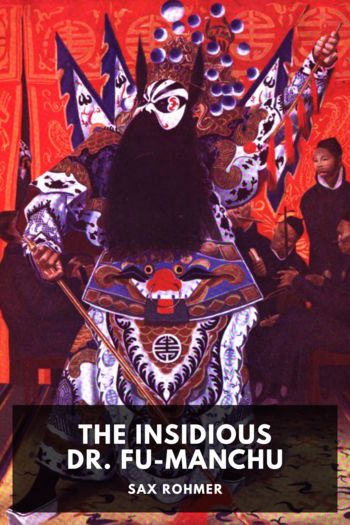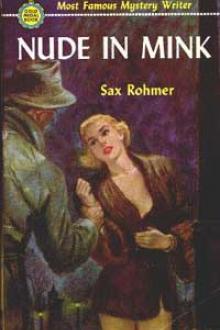author - "Sax Rohmer"

Description
The Insidious Dr. Fu-Manchu, first published in the UK as The Mystery of Dr. Fu-Manchu, is the first novel to introduce the inimitable Fu-Manchu, famous not just for his moustache, but for being a nigh-unstoppable criminal mastermind and part of the “Yellow Peril.” This novel is a collection of previously-published short stories, slightly re-written by Rohmer to form a cohesive whole.
The narrator, Dr. Petrie, is a sort of Watson to Nayland Smith’s Holmes; but Smith resembles more of a James Bond than a Sherlock Holmes as the two barrel through action scenes and near-death scenarios planned by Fu-Manchu, a master scientist, chemist, and poisoner.
This novel was one of the first to popularize the trope of the “mysterious Chinaman,” an element that later became so clichéd that Ronald Knox, the famous detective story writer, declared that “no Chinaman must figure” in good detective stories.
The casual racism evident in the characters and events is a symptom of the xenophobic climate in the UK at the time, which was precipitated by many things—the Opium Wars, the Boxer Rebellion, Chinese immigration, and other fears. Despite that racism, the plot remains fast-paced and engaging, and is lent a modern air by Fu-Manchu’s role as an early prototype for a Bond supervillain.

ing a painted ceiling. Oriental rugs and skins of animals were strewn about the marble floor. Beside a square pool guarded by a figure of Pan, banks of mimosa flowered and filled the air with their heavy swooning perfume.
There was a semi-circular recess, like a shrine, approached by three marble steps and veiled by silk curtains of rosy pink.
The existence of this singular apartment was destined to arouse keen curiosity in certain quarters (and before long) and to provoke equally keen incredulity in others.
A high, sweet note, that of a bell or of a silver gong, split the hushed silence, hitherto unbroken except for faint stirrings of lily leaves in the pool when one of several large golden orfe swimming there disturbed them.
Almost noiselessly, a bronze door was opened at the head of a short flight of marble steps. The handrail also was bronze, terminating in a newel post representing a sphinx. A man came down, slowly. He was a man of slight and graceful build. His leisurely move

adily enough, for, unfortunately, my professional duties were not onerous.
"Good man!" he cried, wringing my hand in his impetuous way. "We start now."
"What, to-night?
"To-night! I had thought of turning in, I must admit. I have not dared to sleep for forty-eight hours, except in fifteen-minute stretches. But there is one move that must be made to-night and immediately. I must warn Sir Crichton Davey."
"Sir Crichton Davey--of the India--"
"Petrie, he is a doomed man! Unless he follows my instructions without question, without hesitation--before Heaven, nothing can save him! I do not know when the blow will fall, how it will fall, nor from whence, but I know that my first duty is to warn him. Let us walk down to the corner of the common and get a taxi."
How strangely does the adventurous intrude upon the humdrum; for, when it intrudes at all, more often than not its intrusion is sudden and unlooked for. To-day, we may seek for romance and fail to find it: unsought, it

Description
The Insidious Dr. Fu-Manchu, first published in the UK as The Mystery of Dr. Fu-Manchu, is the first novel to introduce the inimitable Fu-Manchu, famous not just for his moustache, but for being a nigh-unstoppable criminal mastermind and part of the “Yellow Peril.” This novel is a collection of previously-published short stories, slightly re-written by Rohmer to form a cohesive whole.
The narrator, Dr. Petrie, is a sort of Watson to Nayland Smith’s Holmes; but Smith resembles more of a James Bond than a Sherlock Holmes as the two barrel through action scenes and near-death scenarios planned by Fu-Manchu, a master scientist, chemist, and poisoner.
This novel was one of the first to popularize the trope of the “mysterious Chinaman,” an element that later became so clichéd that Ronald Knox, the famous detective story writer, declared that “no Chinaman must figure” in good detective stories.
The casual racism evident in the characters and events is a symptom of the xenophobic climate in the UK at the time, which was precipitated by many things—the Opium Wars, the Boxer Rebellion, Chinese immigration, and other fears. Despite that racism, the plot remains fast-paced and engaging, and is lent a modern air by Fu-Manchu’s role as an early prototype for a Bond supervillain.

ing a painted ceiling. Oriental rugs and skins of animals were strewn about the marble floor. Beside a square pool guarded by a figure of Pan, banks of mimosa flowered and filled the air with their heavy swooning perfume.
There was a semi-circular recess, like a shrine, approached by three marble steps and veiled by silk curtains of rosy pink.
The existence of this singular apartment was destined to arouse keen curiosity in certain quarters (and before long) and to provoke equally keen incredulity in others.
A high, sweet note, that of a bell or of a silver gong, split the hushed silence, hitherto unbroken except for faint stirrings of lily leaves in the pool when one of several large golden orfe swimming there disturbed them.
Almost noiselessly, a bronze door was opened at the head of a short flight of marble steps. The handrail also was bronze, terminating in a newel post representing a sphinx. A man came down, slowly. He was a man of slight and graceful build. His leisurely move

adily enough, for, unfortunately, my professional duties were not onerous.
"Good man!" he cried, wringing my hand in his impetuous way. "We start now."
"What, to-night?
"To-night! I had thought of turning in, I must admit. I have not dared to sleep for forty-eight hours, except in fifteen-minute stretches. But there is one move that must be made to-night and immediately. I must warn Sir Crichton Davey."
"Sir Crichton Davey--of the India--"
"Petrie, he is a doomed man! Unless he follows my instructions without question, without hesitation--before Heaven, nothing can save him! I do not know when the blow will fall, how it will fall, nor from whence, but I know that my first duty is to warn him. Let us walk down to the corner of the common and get a taxi."
How strangely does the adventurous intrude upon the humdrum; for, when it intrudes at all, more often than not its intrusion is sudden and unlooked for. To-day, we may seek for romance and fail to find it: unsought, it